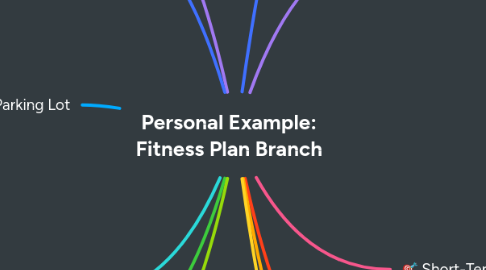Personal Example: Fitness Plan Branch
Door Joseph Baldwin

1. ⚡ Habits & Routines
1.1. Daily: Stretching, hydration, movement breaks.
1.2. Weekly: Strength training, cardio sessions, meal prep.
1.3. Monthly: Progress assessments, goal realignment.
1.4. Seasonal: Adjusting for weather, competitions, or travel.
2. 📈 Phased Long-Term Plan
2.1. Phase 1 (0-3 months): Build consistency and assess initial progress.
2.2. Phase 2 (3-6 months): Increase intensity and refine nutrition.
2.3. Phase 3 (6-12 months): Expand into new fitness challenges (events, competitions).
2.4. Phase 4 (Beyond 1 year): Maintain results, prevent burnout, and adapt long-term.
3. 📝 Parking Lot
3.1. Researching new recovery techniques (e.g., cryotherapy, deep tissue massage).
3.2. Upgrading fitness equipment or gym memberships.
3.3. Experimenting with new workout styles (e.g., Pilates, CrossFit, Yoga).
3.4. Future fitness goals (e.g., running a marathon, weightlifting milestones).
4. 🔗 Integrations
4.1. Connect fitness planning with mental health & mindfulness (meditation, breathwork).
4.2. Align fitness with daily energy levels and work schedule for sustainability.
4.3. Link to sleep tracking & recovery for overall performance improvement.
4.4. Coordinate with travel plans to maintain fitness on the go.
5. 💡 Reflection & Insight
5.1. What's Working?
5.1.1. ✔️ Workouts are scheduled consistently, making exercise a habit rather than an afterthought.
5.1.2. ✔️ Strength and endurance are improving, with measurable progress in key fitness metrics.
5.1.3. ✔️ Recovery practices (stretching, sleep, hydration) are supporting performance and preventing burnout.
5.2. What’s Not Working?
5.2.1. ⚠️ Some workouts feel repetitive or uninspiring, leading to decreased motivation.
5.2.2. ⚠️ Nutrition isn’t fully supporting fitness goals, creating energy fluctuations.
5.2.3. ⚠️ Balancing fitness with work and personal responsibilities remains a challenge.
5.3. Key Takeaways & Adjustments
5.3.1. 🔹 Introduce variety—try new workout styles or cross-training to keep things engaging.
5.3.2. 🔹 Refine nutrition strategy to align with energy needs and recovery.
5.3.3. 🔹 Optimize scheduling to ensure workouts fit seamlessly into daily life without causing stress.
6. 📌 Description/Overview
6.1. A structured approach to physical health and fitness, ensuring that exercise routines, recovery, and nutrition align with long-term wellness goals. This sub-map provides a clear action plan to improve strength, endurance, flexibility, and overall well-being while maintaining balance with other aspects of life.
7. ✅ Action Items
7.1. Develop a customized workout plan based on fitness goals (e.g., weight loss, muscle gain, endurance).
7.2. Establish a training schedule (daily, weekly routines).
7.3. Track progress metrics (weight, strength levels, cardio endurance).
7.4. Implement nutrition and recovery strategies (meal plans, hydration, sleep).
7.5. Adjust workout intensity and structure based on ongoing results.
8. 🎯 Short-Term Goals
8.1. Establish a consistent workout schedule for the next 30-60 days.
8.2. Improve strength, endurance, or flexibility in a measurable way.
8.3. Achieve a specific fitness milestone (e.g., run a 5K, lift a new personal best).
9. 🔄 Recurring Diagnostic Questions
9.1. Am I progressing toward my fitness goals, or do I need adjustments?
9.2. Is my workout intensity and frequency sustainable, or am I overtraining?
9.3. Am I balancing fitness with other priorities in my life?
9.4. How do I feel physically and mentally after my workouts?
9.5. Am I tracking measurable progress, or am I just going through the motions?
10. 🚧 Potential Barriers/Challenges
10.1. Unrealistic goals leading to frustration.
10.2. Nutritional inconsistencies affecting performance.
10.3. Time constraints (work, family, responsibilities).
10.4. Injuries or physical limitations that slow progress.
10.5. Lack of motivation or burnout from repetitive workouts.
11. 👥 Third-Party Professionals Involved
11.1. Personal Trainer (for guidance on workout structure).
11.2. Nutritionist/Dietitian (for optimizing food intake and supplements).
11.3. Physical Therapist (for injury prevention and recovery).
11.4. Sports Psychologist (for mental performance and motivation).
11.5. Health Coach (for accountability and holistic well-being).
12. 🙏 Gratitude
12.1. Acknowledge progress, strength improvements, and energy levels.
12.2. Reflect on how fitness enhances mental clarity and resilience.
12.3. Appreciate small wins like increased endurance, better posture, or new personal bests.

